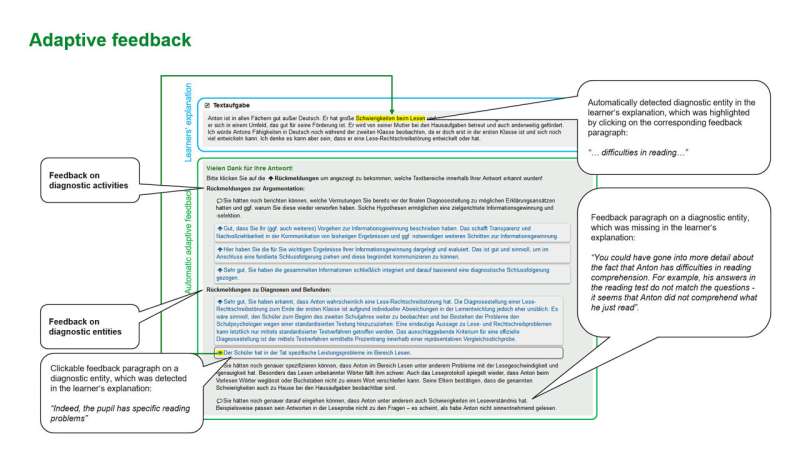
The approach to identifying potential learning difficulties used in the trial improved the reasoning of the teachers.
A research team led by academics at the University of Cambridge and Ludwig-Maximilians-Universitt Mnchen carried out a study with 178 new teachers in Germany. Some of the first evidence that artificial intelligence could enhance teachers'diagnostic reasoning is provided by this study.
During the trial, trainees were asked to assess six fictionalized pupils with potential learning difficulties. They were given examples of their schoolwork and other information. They had to decide whether or not each child had learning difficulties, and explain their reasoning.
Half of the trainees received a prototype solution written in advance by a qualified professional to compare with their own. This is a typical practice material for student teachers. The others received feedback that highlighted the correct parts of their solution and flagged areas they could have improved on.
The two follow-up tests were taken by the trainees without any feedback. The tests were scored by the researchers, who assessed both their diagnostic accuracy and how well they had used the available evidence to make a decision.
The average score for diagnostic reasoning among those who had received feedback during the six preliminary exercises was 10 percentage points higher than those who had not.
The nature of the artificial intelligence may be the reason for this. The researchers believe the feedback was more clear because it analyzed the teachers own work rather than asking them to compare it with an expert version. There is no evidence that artificial intelligence would improve on one-to-one feedback from a human tutor or high-quality mentor.
The study was part of a research project. The team at the Technical University of Darmstadt supported the development of the artificial intelligence.
The Associate Professor at the Faculty of Education, University of Cambridge said that teachers play a critical role in recognizing the signs of disorders and learning difficulties in pupils. Many feel that they have not had enough time to practice these skills. The level of personalized guidance for teachers on German courses is different to the UK, but in both cases it is possible that artificial intelligence could provide an extra level of feedback to help them develop these essential competencies.
New teachers still need expert guidance on how to recognize learning difficulties in the first place, but we are not arguing that Artificial Intelligence should replace them. It seems that the feedback from the artificial intelligence helped these people focus on what they needed to learn. It could be an effective substitute if personal feedback is not readily available.
A natural language processing system is an artificial neural network that is capable of analyzing human language and spotting certain phrases, ideas, hypotheses or evaluations.
The responses of an earlier group of pre-service teachers were used to create it. The system to recognize the presence or absence of key points in the solutions provided by trainees was trained by segmenting and coding these responses. The system gave the participants feedback after selecting pre-written blocks of text.
The trial participants were either asked to work individually or be assigned to randomly-selected pairs. The people who worked alone and received expert solutions scored on average 32% for their diagnostic reasoning during the follow-up tasks. Those who had received feedback scored 42%. The average score of trainees working in pairs was 34% if they had received the expert solution, but 42% if they had received support from the artificial intelligence.
The ability to diagnose the simulated pupils was unaffected by training with the artificial intelligence. It seems to have made a difference by helping teachers cut through the various information sources that they were being asked to read, and provide specific evidence of learning difficulties. The main skill most teachers need in the classroom is this one: the task of diagnosing pupils falls to special education teachers, school psychologists, and medical professionals. To help students access appropriate support, teachers need to be able to communicate and evidence their observations to specialists.
The research team hopes to conduct further studies to explore the mechanisms that made it effective in this case, and assess the wider potential of the technology.
In large training programs, which are fairly common in fields such as teacher training or medical education, using artificial intelligence to support simulation-based learning could have real value. Developing and implementing complex natural language-processing tools888-607-888-607-888-607-888-607-888-607-888-607-888-607-s888-607-s888-607-s888-607-s888-607-s888-607-s888-607-s888-607-s888-607-s888-607-s888-607-s888-607-s888-607-s888-607-s888-607-s is888-607-s888-607-s888-607-s888-607-s888-607-s888-607-s
The research is published in a journal.
More information: Adaptive Feedback from Artificial Neural Networks Facilitates Pre-Service Teachers' Diagnostic Reasoning in Simulation-based Learning, Learning and Instruction (2022). DOI: 10.1016/j.learninstruc.2022.101620 Journal information: Learning and Instruction Citation: Trainee teachers made sharper assessments about learning difficulties after receiving feedback from AI (2022, April 11) retrieved 11 April 2022 from https://phys.org/news/2022-04-trainee-teachers-sharper-difficulties-feedback.html This document is subject to copyright. Apart from any fair dealing for the purpose of private study or research, no part may be reproduced without the written permission. The content is provided for information purposes only.